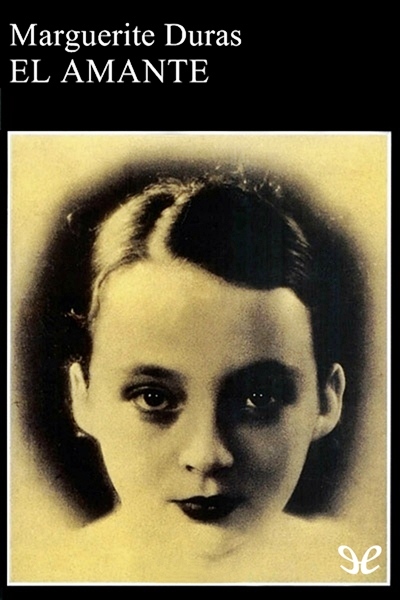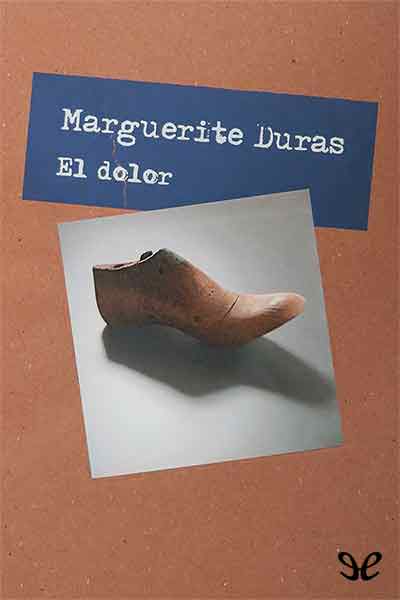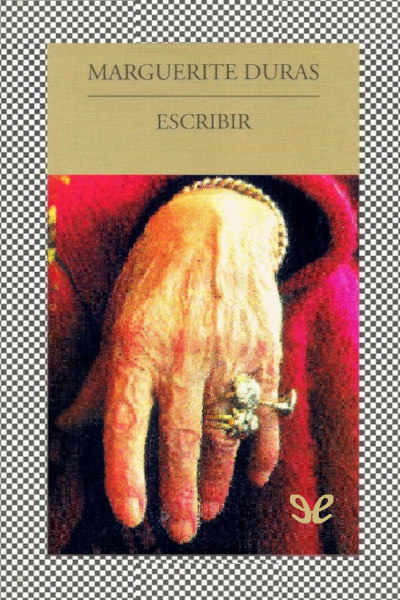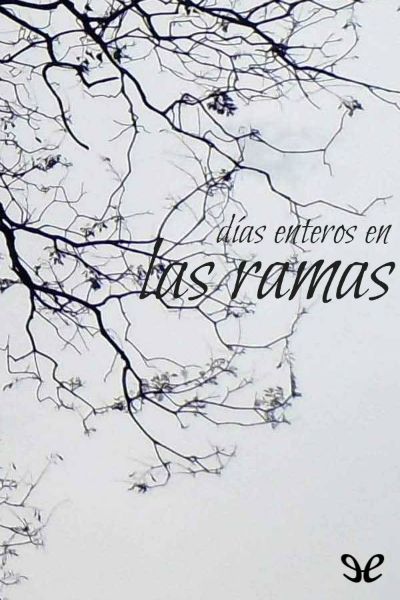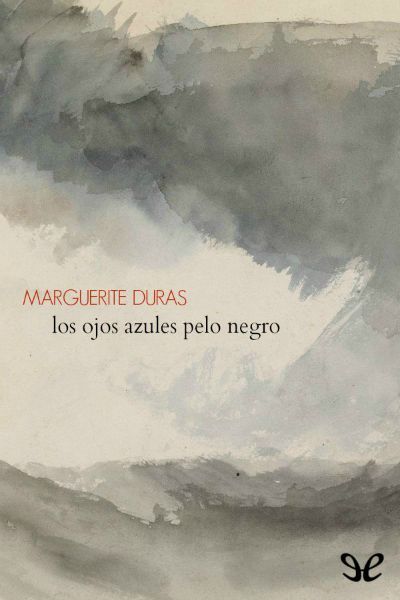oleebook.com
Emily L de Marguerite Duras
de Marguerite Duras - Género: Ficcion
Sinopsis
Marguerite, Duras Year: 2009
Descargar
Descargar Emily L ePub GratisLibros Recomendados - Relacionados
Reseñas Varias sobre este libro
A very short novel by the prolific French author.
A British couple is stranded in a small French seaport waiting for their yacht to be repaired. They frequent the same bar every evening. The story is told from the point of view of a French couple who visit the same bar every night and see the British couple.
But the story is told through a smoky haze and an alcoholic fog: everything they learn about the British couple (they never actually talk with them) is partly glimpsed, half heard, probably misconstrued, perhaps mistaken. The French couple begins to invent a life story for the British couple from these bits and pieces they hear and from the gossip of the bar maid.
Little by little we realize they are projecting their own life story or their wanna-be life story onto the British couple.
other works of Duras (I read four of her works in the collection Four Novels novellas, really), her writing style is very understated. It becomes a dream in a French café.
Well-worth a quick read.
photo of fog from newtravelist/aquitaine.com
phot0 of the author (1914-1996) at age 36 from theredlist.com
french-authors109 s Steven Godin2,571 2,763
Ever wondered while sat in a bar what sort of life the aging couple sat close by are leading or have led? Would you start to imagine their life histories whilst also reflecting on your own? That's kind of what Duras explores in this short novel told in her familiar spare style with lots of really short sentences. This must have been something my tenth Duras novel, and I'd put it somewhere in the middle. It's one her most experimental and original works I'd say, and is a story within a story. One real. One not. It's clever, and despite being told in a rather simple manner, some of her other books, she rarely ever lacks wisdom, depth or complexity, and has a knack of including a startling or strange beauty that slowly builds, which we also get here. I suppose it could be seen as a kind of autobiographical memoir too, which is both meandering and cerebral, about her own intimate feelings and thoughts, perceptions and memories, while she simply relaxes at a table in a familiar cafe with her companion. I really d it. A beautiful and thoughtful book.fiction france45 s Ahmad Sharabiani9,564 149
Emily L., Marguerite Duras
A French couple, sitting in a bar, observes a British yachtsman and his aging wife. They use their English counterparts to examine their own lives. In the process, they find themselves exploring the very nature of love, commitment, and truth itself.
????? ?????? ?????: ??? 1992 ??????
?????: ????? ??? ???????: ??????? ?????? ?????: ????? ??? ????? ?????? ??? ?????? 1370? ?? 115 ?? ??? ????: ?????? ??????? 1394? ?? 117 ?? ????: 9789644485852? ??? ??? 1396? ??? ???? ?? ????? ???? ??????? ?? ????? ????? ?? 115 ? ??? ??? ??? ???? ?????: ????????? ????????? ???????? ??? 20 ?
??? ?? ??? ???: «????? ?? ????? ??? ??? ?? ???? ????? ???? ???? ??? ?? ?? ???? ??? ???? ??????. ?? ????? ???? ??? ???? ?? ???? ????? ???????? ??? ?? ?? ??? ???? ??????? ????? ???? ?? ????? ???? ?? ????? ???? ????? ???? ?? ????? ???? ?? ?? ??? ? ?? ???? ?? ???? ????????. ??? ?? ????? ?? ???? ???? ?????? ????? ????. ?????? ???? ?? ?? ?????? ?? ???? ?????? ???. ?? ?? ???? ???? ?????? ?? ?? ??? ????? ???? ?? ??? ????? ????? ??????? ???? ?? ?? ?? ??????. ?????? ? ???????? ???. ??? ?? ???? ???? ????? ????? ?? ?? ??????? ?????? ?? ??? ? ???? ?? ?? ?????? ?? ????? ????? ?? ??? ????. ???? ????? ?? ?? ??? ?? ????????? ?? ???? ?? ?? «????? ??». ?? ??? ??????? ???? ?? ??????? ?? ??? ?? ?? ???? ?????? ?? ?? ?????! «????? ??» ????? ??? ?? ????????? ??? ?? ?? ???? ?? ????? ????? ? ?????? ?????? ?? ? ?? ???? ?? ??? ??????????? ?? ??? ?? ???? ?????? ?? ????? ?? ??????? «????? ??» ??????. ?? ?? ?????? ???? ?? ??????????? ?????? ??? ?????????. ??? ??? ?? ?????? ?? ??? ?? ?? ?? ?????? ? ??????????? ?? ???????? ? ??? ??? ???? ??? ?????? ??????. ?? ?? ???????? ???? ?? ? ?? ???? ? ????? ?? ?? ??? ??? ????? ???? ?? ??? ???? ???? ?????.». ????? ???. ?. ??????? Rebecca278 372
Contains my favourite letter in literature:
I've forgotten the words with which to tell you. I knew them once, but I've forgotten them, and now I'm talking to you without them. Unly as it may seem, I'm not the sort of woman who gives herself up body and soul to the love of one person, even the person who's dearest to her in the whole world. I am someone who's unfaithful. I wish I could find the words I laid aside to tell you that. And now some of them are coming back to me. I wanted to tell you what I think, which is that one always ought to keep oneself a place, yes, that's the word, a private place, where one can be alone and love. To love one knows not what, nor whom, nor how, nor for how long. To love ... now all the words are suddenly coming back ... To set aside a place inside oneself to wait, you never know, to wait for a love, perhaps for a love without a person attached to it yet, but for that and only that. For love. I wanted to tell you you were what I had waited for. You alone became the outer surface of my life. the side I never see, and you will be that, the unknown part of me until I die. Don't ever answer this. And please don't hope to see me.
*sighs*23 s Michael655 957
Written in understated prose that often borders on poetry, Emily L. reflects upon the cathartic possibilities offered by the process of writing a story, be it based on fact or fiction, in addition to considering the material constraints placed on women's literary production by men. The novel focuses upon two French writers in a quayside cafe as they discuss the course of their affair and invent an elaborate backstory for the English-speaking couple sitting next to them, after eavesdropping on the pair's brief conversation with the bartender. The writers' tale unsurprisingly tells far more about themselves than it does anything about the couple. Duras's prose, as always, is hazy and entrancing. The novel as a whole, though, falls a bit flat compared to more accomplished works The Lover or even The Square, with which the dialogic structure of Emily L. shares much in common. The novel's short length, sparse characterization, and sloppy mirroring of the two couples leaves many (initially) interesting ideas underdeveloped, and the protagonist's sporadic racism is unsettling when it appears, even if she acknowledges her prejudice.201819 s Larnacouer de SH780 170
Sanki o limanda gezinen turistlerden biriymi?im gibi hissederek okudum, tatl? bence.one-sitting-read12 s ZaRi2,321 808 Read
??? ??????? ???? ?? ??? ??? ???? ?????. ?? ??? ????? ?? ?? ???? ?? ?????? ?? ?????? ??? ?????? ???? ? ??? ????? ???? ?? ????. ???????? ??? ??? ?? ??? ??? ????? ???? ???? ????? ? ???? ???? ?? ?? ??? ??? ??? ?????????? ??????? ??? ?? ??????? ?? ????? ???? ?? ???? ?? ??????? ?? ???? ????? ?? ???? ???? ???? ???? ??????? ????.novel women12 s Konserve Ruhlar276 163
Quillebeuf, Kuzey Fransada Seine Nehrinin k?y?s?nda yer alan bir eski bir liman bölgesi. Kitab?n ?iir tad?ndaki hikâyesi bu limandaki Marine Hotelin araba vapuruna bakan kahvesinde geçiyor. Bulutlu bir a?k?n ma?duru Frans?z çift s?k s?k yürüyü?e ç?k?p bu otelin kahvesinde sohbet ediyor. Her ak?am otelin kahvesinde ve bar?nda rastlad?klar? ?ngiliz çiftin konu?malar?ndan duyabildikleri cümlelerle bir hikâye dü?lüyorlar. Kulak misafiri olduklar?yla, kad?n ve adam?n yüzünde gezinen duygu k?r?nt?lar?yla ?ekillenen, de?i?en canl? bir hikâye. Bu melankolik a?k hikayesi ?ngilterenin güneydo?usunda küçük bir adada ba?l?yor. Adam bir kaptan kad?nsa adan?n soylu ailelerinden birinin k?z?. Frans?z çift bu ikiliye hüzünlü bir a?k hikâyesi yak??t?r?yor. Kendi ili?kilerinin ç?kmazlar? da paralel bir sorgulamayla kurgunun içinde ikinci bir hikâye olarak yer al?yor. Yanyanayken bile birbirine uzak insanlar?n hikâyesi.
Devam?:
https://konserveruhlar.wordpress.com/...10 s Stevie Lou48 4
Reading Marguerite Duras is to enter a world where everything is already over, but the last days must be lived out in slow-motion, as if to honour these moments in time. The pages act as an elegy, gleaning from life all possible meaning, from experiences all possible beauty, and halting at moments of extreme poignancy again and again, until darkness comes. To read Duras is to experience the sharpness of the possibility of love already passed, to saturate oneself with it and finally to bury it. Duras does nostalgia at it's most painful and beautiful - telling tales of love and sorrow via colours and light, seasons and times of day. Duras's characters live by the moon and turning of the tide, revealing themselves through tales of exile and coming home, through stories of losing, finding, and losing again. Emily L., in classic Duras style, brings us to the moment of death, simultaneously as it brings us to the brink of a perfect summer. One is left with the certainty that the pattern of love and loss will continue, across times and continents - far beyond the close of the book.
feminist-lit modern-fiction9 s Amirsaman439 236
????????? ??????? ???????.9 s Pooya Kiani388 108
????????? ???? ?? ??????? ?? ??? ?? ??????????? ????? ????? ? ??????? ??? ??????? ????? ????. ??? ? ?????? ?? ???? ???? ?? ???????? ????? ????? ????????.novel-????7 s Nirvana95 22
?????? ?? ?? ??? ???? ?? ? ??? ????? ???.
??? ???:
??? ???? ????? ?? ???? ??? ?? ??? ??? ????? ?? ???? ??? ????? ??? ????. ???? ???? ???? ????. ???? ???? ?????...???? ???? ?? ???? ???? ??? ????? ???? ???? ?????? ?? ???? ???? ???? ???? ???? ????? ???? ???? ???.??? ????? ??? ???? ???.6 s Haman270 60
???????? ??????. ???????? ?? ????? ???? ?? ????? ?? ??? ??????? ???????? ?? ??????? ? ??? ?? ?????????. ?? ???????? ?? ???? ????? ???????? ???? ? ????? ????? ???? ??????? ???????? ??????. ???????? ????????? ????? ?????? ?? ?? ???????? ?? ???. ?? ??? ????? ??????? ?? ???? ?? ???????? ??????.
???? ????? ???????? ? ??? ?? ??????? ?? ????????? ?????? ?? ????????? ???????. ????????:
?? ??? ?? ??? ??? ??????? ??????. ???? ?? ????? ????? ???? ??? ?????????? ??? ????? ??? ???????.
?? ???????? ????? ???????. ????????. ?? ??? ??????? ?? ?? ??????????? ?? ?? ?????????. ?? ??? ?????? ?? ??? ????? ?? ?????.world-novel6 s Aydan Yalç?nAuthor 67 books138
2,5 falan.library6 s Smiley 776 18
3.5 stars
I have found reading this short novel arguably interesting due to its eighteen three-dot intermissions (. . .) between traditional paragraphs of narratives with generous uses of the pronouns, we, you and I that obviously suggest her writing style. However, it's a bit perplexing when there are two tenses in each paragraph using the same pronoun as we can see from the following:
IT BEGAN WITH THE FEAR.
We'd driven to Quillebeuf, as we often did that summer.
We got there at the usual time, late afternoon. As usual we went for a stroll beside the white rail that runs along the quayside from the church at the entrance to the harbor to the disused path that leads out of it, probably to the forest of Brotonne.
We look at the tanker port on the other side of the river, and at the tall cliffs of LeHavre in the distance, and at the sky. . . . (p. 3)
These two paragraphs have posed a problem related to the sense of time, in other words, she has narrated in the past, past perfect and present tenses in the first paragraph. Then, out of the blue, she starts her second paragraph with the present tense that has since made me keep asking myself why.
And another vividly tense-related problematic paragraph:
We were a long way past the plateau now. Instead of taking the expressway at Pont-Audemer, we'd turned off towards Foulbec and Berville -- we wanted to go past the bay. At Berville we made for what used to be the harbor of Rouen. You come upon the bay quite suddenly. After a lot of little clumps of trees you emerge on what we call the German factory, a huge empty hulk with shattered windows. Tonight the wind isn't whistling through it. We stop. (p. 106)
We understand that the first and the second sentences using 'We' and 'we' that seemingly include the narrator and her companion. But for the following sentence with 'You', I wonder if she means her reader or her companion and why she has switched to the present tense. For immediacy or what?
This was one of the reasons that I couldn't help reading this novel on and off due to her magically veering of alternate tenses at will. However, there're some interesting points worth mentioning as we can see in these three extracts as follows:
Before the succession of ordinary factory shoes they'd found in the shops during the last ten years, she'd had some made to measure in Southampton . . . (p. 76)
Clothes were another thing , but in the long run it all boiled down to the same -- nothing fitted her anymore, and she positively refused to go into a shop. So? So what? So nothing. That's how it was now. . . . (p. 76)
"I don't know if love's a feeling. Sometimes I think it's a matter of seeing. Seeing you." (p. 101)
When I read the first, it reminded me of what I've seen before, that is, made to order so 'made to measure' is another viable usage. While the second suggests a three-word cluster highly conversational, monolog-; presumably said to herself out of irritation. As for the third, it again reminded me of a song entitled To See You Is To Love You (1952) (https://www.youtube.com/watch?v=0DetD...). I think the speaker might have heard of the song before; therefore, she tacitly rephrased as if to say, "Seeing you is loving you."
To continue . . .novel6 s Paige Sweet2 1 follower
Emily L is essentially a book about writing, about the fears and dangers of writing as well as its ability to circulate beyond the writer's control. This comes through most strongly through the poems of the character Emily, especially the one poem that is destroyed. This poem, which is really a poem by another famous poet (though this is not disclosed within the novel, and I don't want to disclose here in the interest of preventing the pleasure of discovering it on one's own), ties this character to the historical figure of the one who wrote the poem. It also demonstrates a connection that this character has to the unnamed character, presumed to be Duras herself. At this level, it also shows how the English couple functions as a kind of mirror for the French couple (Duras and her campanion, Yann Andrea). In this sense, the French couple use the English couple as a kind of proxy to work out issues or questions about their own relationship, including tricky questions around writing.
If you enjoy Duras's style, you will probably enjoy this book. It has her signature techniques of experimental memoir, meditations about writing, a contemplative tone that seems to resonate with the waves of the sea in the distance, and a few (not entirely unproblematic) references to her childhood in French Indochina (such as her references to the Koreans, which reads as slightly racist even if it serves, in typical Durasian fashion, to highlight gender differences over racial ones).
(SPOILER ALERT ---> plot details disclosed in this paragraph) I particularly enjoy this novel (which I just read for the second time), because of the way it invokes the questions of a community of women writers who do not know each other and yet are transformed through the encounter with writing. The inclusion of the poem by Emily Dickinson, along with the title of the novel and the character's name, secures this novel as an important link in an elaborate chain of writing that invokes and/or re-writes Dickinson as part of an imaginative exercise of thinking about the fate of women writers and their work. Above all, this constellation of writers seems to ask--in a Dickinsonian kind of way--about the internal difference between how women's writing is read by women or by men. This isn't to reduce the novel to this question, but rather to suggest that the question of internal difference is the one that the book (and the poem) continuously open onto.5 s Helena Bracieira119 61
Opinião publicada em: As Horas... que me preenchem de prazer.
Verão em Quillebeuf, localidade contígua ao rio Sena e quase perto da sua foz. Com vista para este cenário um pretenso casal, possivelmente de escritores, encontra-se num bar onde, na sua troca de divagações surgem acusações veladas - "Por vezes, quando falamos os dois, isso é tão difícil como morrer" - e uma procura de sentido sobre aquilo que os une, ou desune.
Ao engano vamos se julgamos que encontraremos a história da narradora e do seu incógnito companheiro com que a narrativa se inicia. Até ao fim há um desconhecimento das circunstâncias da sua ligação, dando azo a especular se não seria a voz de Marguerite Duras a acompanhar-nos. Será antes dado destaque ao amor de um casal de ingleses, Captain e a sua mulher poeta, Emily L. A sua vida será recriada pelo casal de observadores e nela se fala de infidelidade, abdicação e fuga. A fuga necessária para preservar um amor conservado em álcool e marcado pela diferença entre classes sociais e entendimentos.
Dividida em pequenas partes ao invés de capítulos, é uma leitura que flui sem entraves, porém paragens para reflexão exigem-se. A história adquire importância relativa pelas suas indefinições: um relato que não explora os pormenores em demasia, dando primazia aos sentimentos e emoções das personagens.
Surgem apontamentos sobre a criação literária que reflectem a visão da narradora e, quem sabe, a da própria autora: "Que alguém tenha dito isso naquele dia é o que fará com que este livro se escreva. O livro será sincero. Que o tenhamos dito nós, ou o tenhamos ouvido através da parede, dito por outro qualquer a uma outra qualquer, é indiferente para o livro, uma vez que o ouviu ao mesmo tempo que eu ouvi, num mesmo lugar. Num mesmo susto".
Uma falha que aponto é a ausência de tradução das frases em inglês. Quem desconheça a língua terá certamente de recorrer a um dicionário variadas vezes.
Este livro é um exercício que nos leva a questionar as problemáticas da capacidade criativa dos escritores e, tema intemporal, o papel do amor nas nossas vidas.
4,0/5*2017 autores-estrangeiros nas-estantes ...more5 s AnaAuthor 14 books210
Num bar de um porto marítimo, um casal observa o ambiente e conversa. Ao balcão do bar, um outro casal bebe. É um casal curioso, de viajantes, e desperta o seu interesse. À medida que vão descobrindo a história desse casal estranho e desconhecido, vão também abrindo caminho para temas sobre si próprios e sobre a sua própria relação. Numa escrita nada convencional, Marguerite Duras conta-nos aqui histórias de amor, loucura, obsessão, sonhos perdidos e morte. Uma narrativa que senti como etérea, meio sonhada e imaginada, que apesar do cheiro a sol e maresia deixou um travo amargo de dor.
ENG:
In a bar in a seaport, a couple observes the surroundings and talks. At the bar counter, another couple drinks. It is a curious couple, of travelers, and it arouses their interest. As they discover the story of this strange and unknown couple, they also open the way to themes about themselves and their own relationship. In a writing that is anything but conventional, Marguerite Duras tells us stories of love, madness, obsession, lost dreams and death. A narrative that I felt as ethereal, half-dreamed and imagined, that despite the smell of sun and sea spray left a bitter taste of pain.20th-century fiction french-literature ...more3 s ???? ??????146
?? ??? ???? ????????? ??????? ????? ???????? ?? ??? ???????? ?????? ?????? ??? ????????? ???????? ? ???? ?? ??? ??????? ?? ?????? ??????? ????????. ?????? ???? ?????? ?? ??? ????? ?? ??? ? ???? ?? ???? ?? ??? ??? ?? ??? ??????? ??? ??? ?? ??? ????? ???????? ????? ???? ????. ?? ??? ???????? ????. ??? ???????? ?????? ?? ?? ?? ???? ????? ?? ??? ????? ???? ?????? ????????. ?? ?????? ??? ???? ??? ???? ??????? ????? ???. ????????? ???? ?? ?? ??? ?????? ??????? ?????? ????? ????? ?? ??? ???? ????? ?? ???? ??? ???? ??-???? ?????? ??? ????? ?? ???? ??? ????? ??? ????. ???? ???? ???? ???? ???? ???? ???? ????? ???? ???? ?????. ????? ?????? ?? ?? ??? ?? ???? ? ????? ? ???? ?? ??? ???? ???? ???? ????? ????????. ???? ???? ????? ?????? ?? ???? ???????... ???? ?????... ???? ???? ?? ???? ???? ??? ????? ???? ???? ??????-??? ?? ???????-???? ?????? ?? ???? ???? ???? ???? ???? ????? ???? ???? ???. ??? ????? ??? ???? ???. ????????? ???? ??? ??????? ????? ?? ??? ?? ?????? ????????. ???? ??? ?? ?????? ???? ?????? ???????? ???????. ????? ?? ??????? ?????????? ? ??? ?????? ?? ???? ?? ???? ???????? ???? ?? ???? ?????? ????? ?? ????? ???. ???? ??????? ?? ?????? ???????. ??? ????? ?? ?? ????? ?? ?????? ?????? ???? ??????. ????? ??
?101
***
????? ????? ?? ?? ?? ???? ?? ?????? ???? ?? ????????? ? ??? ????? ???? ?????? ?? ???? ??? ????? ??? ????? ?? ????? ??? ????? ?? ?? ? ???? ?? ???
?1143 s Edita1,509 520
I've forgotten the words with which to tell you. I knew them once, but I've forgotten them, and now I'm talking to you without them. [...] I wish I could find the words I laid aside, to tell you that. And now some of them are coming back to me. I wanted to tell you what I think, which is that one always ought to keep oneself a place, yes, that's the word, a private place, where one can be alone and love. To love one knows not what, nor whom, nor how, nor for how long. To love... now all the words are suddenly coming back... To set aside a place inside oneself to wait, you never know, to wait for a love, perhaps for a love without a person attached to it yet, but for that and only that. For love. I wanted to tell you you were what I had waited for. You alone became the outer surface of my life, the side I never see, and you will be that, the unknown part of me, until I die.
marguerite-duras4 s Jolanta (knygup?)995 216
Prancuzu rasytojos Marguerite Duras, "Meiluzio" autores, kita nuostabi knyga -"Emily L.".
Tai melodingas, melancholiskas pasakojimas apie meile, isipareigojimus ir apie kuryba, rasyma.
Prancuzu rasytoju pora bare stebi kita -britu sutuoktiniu pora, uzstrigusia siame mazame Prancuzijos uoste sugedus ju jahtai. Jie sedi prie to pacio staliuko diena is dienos. Kalbasi, nesikalba, geria, laukia....Skaitytojui si istorija yra pasakojama prancuzu poros, kuria jie rezga tik is nugirstu britu sutuoktiniu pokalbio fraziu, zodziu, is tylejimo...Va tokia originali konstrukcija.
Mane labai zavi Duras trumpuciai sakiniai. Kartais sakinys - tik vienas zodis. Tai puikiai padeda(manau) kurti nuotaika reikalinga tokiam graziam liudnumui. Man sis tekstas skambejo lyg koks bliuzas.
REKOMENDUOJU!
french-literature5 s Nate D1,603 1,105
Two writers in a cafe watch a second unknown couple, their own histories intertwining with the narratives they appear to build around their unwitting subjects. It's another one of Duras' late, resolute reductions of set and plot to an essential iterative dialogue, and it works much as elegantly as the others, becoming a conduit for raw. metaphysical desperation and despair. And the act of writing (here two-tiered) as an attempt to deal with such. Pure, hard, cataclysmic.80s france nouveau-roman4 s kelly166 4 Read
"You alone became the outer surface of my life, the side I never see, and you will be that, the unknown part of me until I die."
the unequivocal pleasure of reading duras lies in the familiarity of her themes and other repetitions; her novels blur together and form a distinctive body of work, interrogating desire, lost loves, memory, selfhood, writing and the dissolution of relationships to their very limits. it's hard to read emily l. without bringing duras and her personal life into the equation. the novel has a rich confessional quality that is utterly hypnotic. while the the lover is sometimes classified as an example of early autofiction, emily l., with its explicit, metafictive consideration of storytelling's tremendous potential and inadequacies when portraying reality's truths, this novel can be taken as duras's own meditations on her personal relations and relationship with writing exposing the necessity and violence of it. sparse but revelatory, this is essential duras.20223 s Aviendha310 18
Kitab?n farkl? bir anlat?m? var. Dingin ilerleyi?ini okuyucu uzaktan izliyor gibi sanki. Ancak çeviride aç?klamas?z kalan k?s?mlar?n neden b?rak?ld???n? anlayamad?m. Paralel anlat?mlarla yal?n bir hikaye okumak isterseniz ?ans verebilirsiniz.3 s Zeynep Atak?r26 17
Çok güzeldiowned3 s Zacharie Nadouille33
PAIN
(lire cette review en français et en anglais, s'applique au livre dans les deux cas) 3 s Natalina Rossi46 9
Inizialmente molto noioso e incomprensibile, ma quando si capisce qual è il punto centrale della storia diventa molto bello!2 s Petter Lundqvist48 Read
Nä Marguerite, den här dumma hjärnan orkar inte med att läsa mer mellan raderna.
Önskar tips på en TYDLIG Duras-roman. 3 s EmilyAuthor 54 books128
(First read & reviewed in May 2010). I loved it. This was so beautiful. Over all, I loved the idea of it: a couple of writers looking at another couple, inventing their story at the same time they talk about their own story. They argue, they contradict each other, they talk about writing.
At first it seemed a bit weird, hearing the author's voice, but then it seemed totally original.
The dialogues are fantastic. Some quotes deserve to be noted down, remembered forever (even though we later forget about them). And the story about the English couple, so heartbreaking. The ending was also perfect.
Very short, but makes you think a lot.made-an-impression read-in-2010 read-in-20133 s Brenda119 137
Autor del comentario:
=================================

